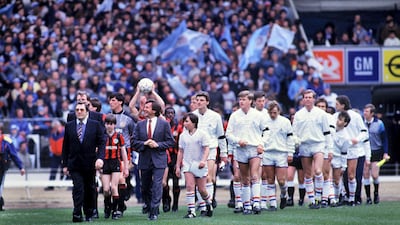Just after Chelsea and Manchester City had won their respective League Cup semi-finals last month, an apocryphal line started circulating about this weekend’s Wembley showdown being the first domestic cup final to be contested between the two clubs.
It was a “fact” that was quickly corrected by those who remember an era when neither side was regularly picking up silverware and English football was far removed from the millionaire players and squad rotations of today.
In fairness, given the previous Wembley cup final encounter between the two teams had been in a competition that only survived for seven seasons until the introduction of the Premier League in 1992, it is not surprising that it is now a small footnote to the history of both clubs.
It was in March 1986 when the two teams contested the inaugural Full Members’ Cup final before close to 68,000 fans. The game finished 5-4, providing a spellbinding finale to the first staging of what had otherwise been a damp squib of a competition.
Those were very different days for English football. Stadiums were poorly maintained relics from a bygone era, attendances were falling away across the country, match-day violence was a regular occurrence and English sides had been banned from European competition following the Heysel Stadium disaster in Belgium in 1985 in which 39 mostly Juventus supporters lost their lives before the European Cup final with Liverpool.
As for Chelsea and City, the Eighties were a challenging decade for both clubs. The Manchester club was relegated from the First Division in 1983, promoted in 1985, relegated again in 1987 and promoted back to the top tier in 1989.
Chelsea, meanwhile, had been relegated to the Second Division in 1979, promoted in 1984, relegated in 1988, only to return to the First Division as second-tier champions in 1989.
The 1986 Wembley final was an undoubted high point for both sides.
Few competitions sum up the strange world of English football in the 1980s better than the Full Members’ Cup, later sponsored by sportswear manufacturer Simod and desktop computer company Zenith Data Systems.
Only 21 teams from the top two tiers of the English league, its “full members”, bothered to enter the 1985-86 competition, five from the old First Division, including City and Chelsea, and 16 from the Second Division. Coventry City, Oxford United and West Bromwich Albion made up the rest of the infamous five.
The rest thought it was an unnecessary addition to an already clogged fixture list. The top clubs of the day - including champions Everton and FA Cup winners Manchester United - played in an even more ill-conceived tournament, the Screensport Super Cup, a replacement for the absence of European competition, which would be dumped after only one season even though the European ban would stay in place until 1990.
Entrants to the Full Members’ Cup were split into north and south groups, with City and Chelsea winning through to the final after topping their groups and regional final wins against Hull City and Oxford United, respectively.
Most games were played before small crowds. Many pundits predicted Wembley would be empty for the final, although the attendance on the day was probably helped by fans being able to pay on the gate rather than buy tickets in advance.
The final was not considered prestigious enough to be broadcast live by either of the two main UK broadcasters.
Preparations for the big day were hardly ideal. The league refused to clear the weekend’s fixtures for the Wembley showpiece and had suggested the pair play the final in midweek, which the clubs objected to, citing a likely lower attendance.
A compromise of sorts was reached, in which both teams played on Saturday afternoon in the league and then travelled to Wembley to play the cup final on the following day.
The first part of the weekend worked out well for both teams.
In their league match, City came from two goals down to draw at Old Trafford against title-chasing Manchester United, courtesy of a spectacular own goal from Arthur Albiston, who fired in from the edge of his own box. Chelsea, meanwhile, won 1-0 at Southampton and were considered favourites for the final.
Neither side looked especially fatigued for the big match and, after a bright start, City took the lead through an eighth minute deflected goal by Steve Kinsey. Chelsea were level 11 minutes later through David Speedie and Colin Lee put the London side ahead before half-time.
Speedie scored twice more in the opening stages of the second half to wrap up his hat-trick, a Wembley rarity in those days, and Lee made it 5-1 with ten minutes to go.
The introduction of Paul Simpson, who is now a World Cup winning manager with England’s U20 side, as a late substitute by City almost turned the game on its head.
Simpson’s wing-play created two gilt-edged chances for City, one of which was headed in by striker Mark Lillis, the other by Chelsea defender Doug Rougvie. Lillis also scored a last-minute penalty after Andy May had been tripped in the box.
There was barely time for the restart before referee Alan Saunders blew up for full-time, much to the relief of the massed ranks of Chelsea fans who 10 minutes earlier had been celebrating a comfortable scoreline.
Chelsea won the Full Members’ Cup twice in its short history, as did Nottingham Forest. Four teams -
Liverpool, Manchester United, Arsenal and Tottenham Hotspur - never entered the tournament at all. More often than not the final delivered a goal-rush: 33 goals were scored in its seven finals and the Wembley showpiece was an occasion relished by fans.
Not bad for what many considered a joke competition.


